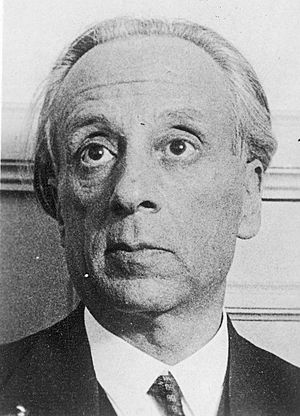Álvaro de Albornoz facts for kids
Álvaro de Albornoz y Liminiana (born June 13, 1879, in Asturias, Spain – died October 22, 1954, in Mexico) was a Spanish lawyer and writer. He was also one of the important people who helped create the Second Spanish Republic.
Contents
Early Life and Education
Álvaro de Albornoz started his studies in his hometown of Luarca. Later, he went to the University of Oviedo to study law. During his time at university, he became interested in the Republican Party. This was common among smart people back then. Some of his teachers helped shape his ideas.
After finishing his studies, Albornoz went back to Luarca. In 1899, he married Amalia Salas. They had two children, Maria de la Concepción (called "Concha") and Alvarito. For ten years, Albornoz worked as a lawyer. He also became more involved in socialist activities and wrote for a political newspaper. In 1909, he joined the Radical Republican Party. He was elected to the Spanish parliament in 1910. After 1914, Albornoz decided to leave politics for a while to focus on his law work and writing.
Political Career and the Second Spanish Republic
In 1929, while in prison, Albornoz helped start a new political group called the Radical Socialist Republican Party.
In 1930, Albornoz was arrested and faced legal charges. However, he was found innocent. His lawyer was Victoria Kent, who was the first woman to become a lawyer in Spain.
Albornoz was an important member of the elected Spanish Second Republic. After the king left Spain, he became part of the temporary government. He also led the group that wrote the new constitution. As the first president of the "Tribunal de Garantías Constitucionales," he helped make important changes. These changes included making the government more separate from the church. He also served as the Minister of Justice and the Minister of Public Works.
In July 1936, he became Spain's Ambassador to Paris. But by September, he was replaced and had to return to Spain, which was then in the middle of a Civil War.
Life in Exile
In 1939, Albornoz, his wife, and his daughter Concha moved to Havana, Cuba. They later settled in Mexico City. His son Alvarito and his family also joined them there.
Even in exile, Álvaro de Albornoz continued to represent the Spanish Second Republic. He was active in the community of Spanish people living in Mexico City. He helped start a cultural center called the Ateneo Salmerón. He also worked with other political leaders to support the elected government of Spain. From 1940 to 1945, he was named President of the Republic of Spain in Exile. He also served as Prime Minister from 1947 to 1951.
He kept in touch with people in other countries and even attended a United Nations conference. However, his efforts to restore the elected government of Spain were not successful because Franco remained in power.
Albornoz died on October 22, 1954, in Mexico City.
Family
Álvaro de Albornoz's nephew, Severo Ochoa, won the Nobel Prize in Physiology or Medicine in 1959.
He was also the great-uncle and godfather of Aurora de Albornoz, a well-known poet and writer.
Works
Álvaro de Albornoz wrote many books and articles, mostly about politics and society. Some of his works include:
- La Instrucción, el ahorro y la moralidad de las clases trabajadoras (1900)
- Individualismo y socialismo (1908)
- Ideario radical (1913)
- El partido republicano (1918)
- La tragedia del estado español (1925)
- La política religiosa de la República (1935)
- Páginas del destierro (1941)
See Also
 In Spanish: Álvaro de Albornoz para niños
In Spanish: Álvaro de Albornoz para niños
 | Bessie Coleman |
 | Spann Watson |
 | Jill E. Brown |
 | Sherman W. White |


